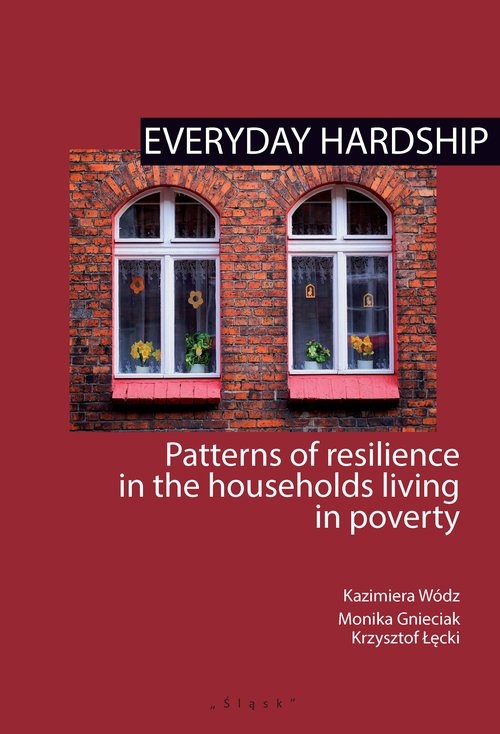The three separate research projects selected for the book fall into place and the well-thought-out whole features: (a) coherence of the theoretical perspective, which is a combination of classical anthropological concepts and the traditions of sociological research over urban collectivities, (b) continuity in research interests focused on everyday and widespread impacts of the economic restructuring, the effects of which came to be suffered by the next generation of Upper Silesia’s population, (c) as a result of which the conducted explorations orbit around the processes of pauperization of the population (here, admittedly, of whole estates) traditionally connected with heavy industry, (d) of which the researchers seem to be most interested in is how the economic transformation has led to a comprehensive reorganization of the cultural foundations on which the existence of native Silesian communities was based. Add to that the adopted (e) methodology, whose invariable link with the qualitative procedures additionally enhance the sense of continuity, which makes various research undertakings seen from the time perspective fit into one picture, description of changes in the social and cultural identity of (post)mining collectivities. (From the review of Professor Krzysztof Frysztacki)
Introduction
Part one. Everyday life in the old working-class districts of the industrial towns and cities of Upper Silesia
Chapter 1. Working class estates of Upper Silesia region – the social world of their residents
1.1. The city from the perspective of everyday life
1.2. Anthropological approach in the sociology of the city
1.3. Working-class estates of Upper Silesia – the social world of their residents
1.4. Upper Silesian region in the process of transformation Chapter 2. Transformation processes and changes of urban space of Upper Silesian towns
2.1. Social consequences of restructuring of old industrial districts
in Upper Silesia
2.2. Place and memory: the case of Ksawera estate
2.2.1. Place and Memory
2.2.2. Paryż/Zawadzki/Paryż mine
2.2.3. Ruins and “ghosts of the past”
2.2.4. Spatial symbolic representation of capitalism
2.2.5. Conclusions
Part two. Old and new poverty in Upper Silesia
Chapter 3. Urban anthropology in the research on poverty
3.1. The concept of “urban villagers” by Herbert Gans in the study on enclaves of poverty. An Upper Silesian perspective
3.2. Underclass in the city
Chapter 4. The Social History of Poverty in Central Europe. A research method
4.1. New and Old Poverty in Upper Silesia
4.1.1. Methodology
4.1.2. Old and New Poverty in a cultural border region: two case studies
4.1.3. Summary
Part three. Poverty and resilience
Chapter 5. RESCuE Project
5.1. General assumptions of the project
5.2. Cultural sources of resilience. Theoretical basis for the research carried out in Upper Silesia
5.3. The research area and participants against the backdrop of Polish economic crisis
5.3.1. Urban Case
5.3.2. Rural Case
5.4. Observations from the field
5.4.1. Observational strategies
5.4.2. Results from the observation
5.4.3. Field access and contacting
5.4.4. Sampling criteria
5.4.5. Conducting interviews
Chapter 6. Cultural practices and resilience. An analysis of research material 6.1. Symbolic capital
6.2. (Socio)economic capital
6.3. Social capital
6.4. Cultural capital
(...)
Introduction
Part one. Everyday life in the old working-class districts of the industrial towns and cities of Upper Silesia
Chapter 1. Working class estates of Upper Silesia region – the social world of their residents
1.1. The city from the perspective of everyday life
1.2. Anthropological approach in the sociology of the city
1.3. Working-class estates of Upper Silesia – the social world of their residents
1.4. Upper Silesian region in the process of transformation Chapter 2. Transformation processes and changes of urban space of Upper Silesian towns
2.1. Social consequences of restructuring of old industrial districts
in Upper Silesia
2.2. Place and memory: the case of Ksawera estate
2.2.1. Place and Memory
2.2.2. Paryż/Zawadzki/Paryż mine
2.2.3. Ruins and “ghosts of the past”
2.2.4. Spatial symbolic representation of capitalism
2.2.5. Conclusions
Part two. Old and new poverty in Upper Silesia
Chapter 3. Urban anthropology in the research on poverty
3.1. The concept of “urban villagers” by Herbert Gans in the study on enclaves of poverty. An Upper Silesian perspective
3.2. Underclass in the city
Chapter 4. The Social History of Poverty in Central Europe. A research method
4.1. New and Old Poverty in Upper Silesia
4.1.1. Methodology
4.1.2. Old and New Poverty in a cultural border region: two case studies
4.1.3. Summary
Part three. Poverty and resilience
Chapter 5. RESCuE Project
5.1. General assumptions of the project
5.2. Cultural sources of resilience. Theoretical basis for the research carried out in Upper Silesia
5.3. The research area and participants against the backdrop of Polish economic crisis
5.3.1. Urban Case
5.3.2. Rural Case
5.4. Observations from the field
5.4.1. Observational strategies
5.4.2. Results from the observation
5.4.3. Field access and contacting
5.4.4. Sampling criteria
5.4.5. Conducting interviews
Chapter 6. Cultural practices and resilience. An analysis of research material 6.1. Symbolic capital
6.2. (Socio)economic capital
6.3. Social capital
6.4. Cultural capital
(...)
Kraj produkcji: Polska
Producent:
„ŚLĄSK” SP. Z O.O. WYDAWNICTWO NAUKOWE
ul. Podgórna 4
40-026 Katowice (PL)
tel: 32 258 07 56
email: [email protected]
Szczegóły
Tytuł: Everyday hardshipPodtytuł: Patterns of resilience in the households living in poverty
Autor: Kazimiera Wódz, Monika Gnieciak, Krzysztof Łęcki
Wydawnictwo: Śląsk
ISBN: 9788381830447
Języki: angielski
Rok wydania: 2020
Ilość stron: 366
Format: 16 x 23,5 cm
Oprawa: miękka
Recenzje
Informacje:
Klienci, którzy kupili oglądany produkt kupili także:
Pokora
Literackie
Korfanty. Silna bestia
Post Factum
Sztuka po roku 1989
Bosz
Nie tylko o fotografii
Universitas
Bruegel. Zbliżenia
Arkady
Tamara de Lempicka
Bosz
Siedem wykładów z psychologii sztuki
Zysk i S-ka
Tajemnice wielkich oper
Rozekruis Pers













